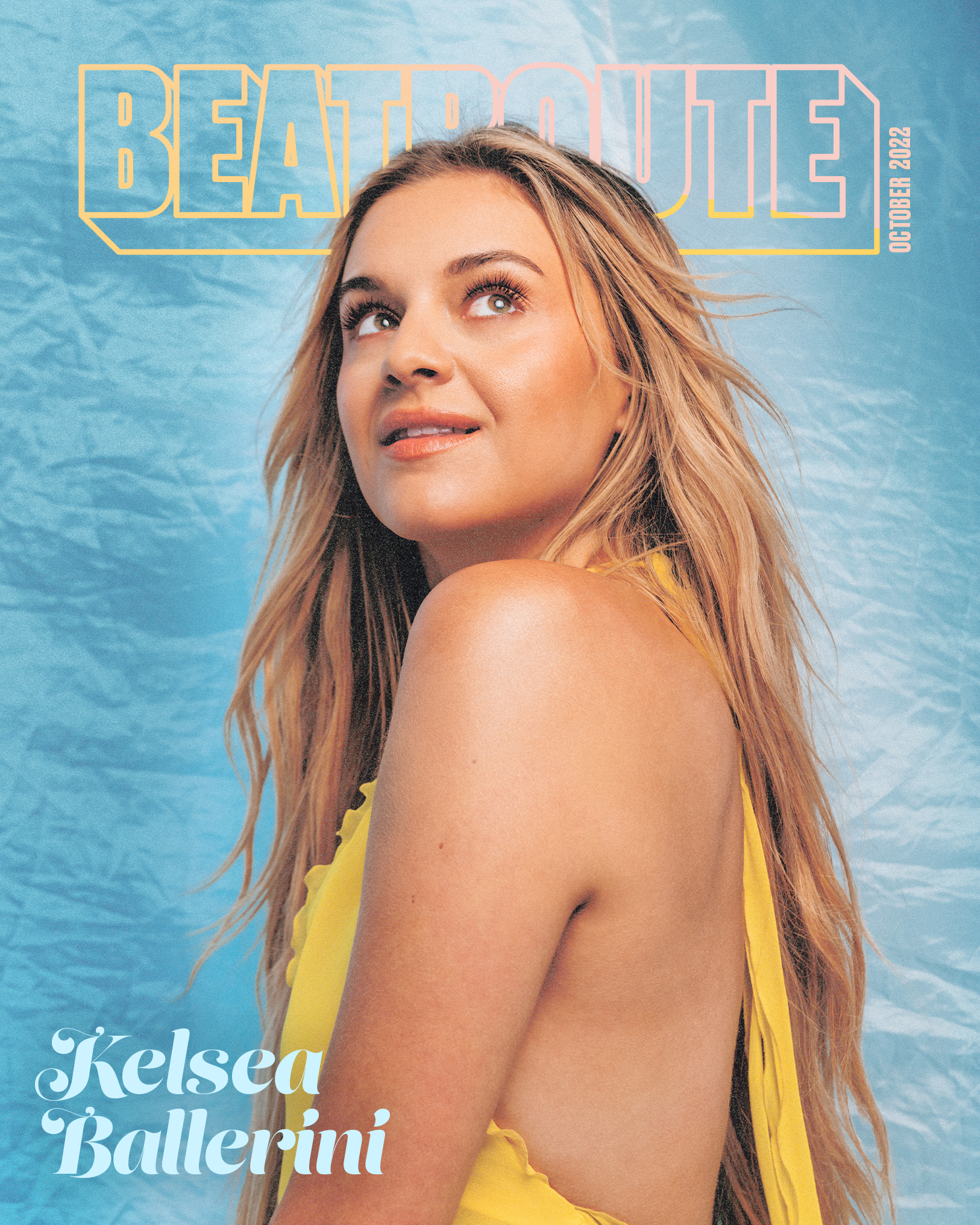COVER
Kelsea Ballerini
Is Embracing Change
By Gabby Sgherri
Publishing date: Oct 04, 2022
M
My definition of success is are you happy? which is an ever-evolving answer because what makes you happy is always changing,” Kelsea Ballerini muses while perched on the sofa in her New York hotel room chatting to me through Zoom. It’s exactly two weeks before her new album is released, she’s in town for New York Fashion Week and her excitement is so palpable it can be felt even through a screen. “I don’t see myself,” she pauses to reflectively disclose that she’s a Virgo, “I don’t see myself pushing in a direction that doesn’t make me happy in any way in my life. I really believe in chasing down happiness and that’s success to me.” It’s no coincidence that her “ever-evolving answer” feels aligned with the concept for her fourth studio album, Subject to Change. Ballerini never picks a theme for her records before she writes them because “it puts blinders on and it doesn’t let you creatively write about your whole life” but looking through her 80+ demos spanning a year and a half of writing—a theme organically emerged. Recognizing her growth in perspective, on many things she was writing about, she realized the process of undergoing change was a universal experience. Now, more so than ever given the pandemic. “I liked the idea of claiming the power back from change and not letting it be so scary [by] having a concept where if you embrace change then maybe that’s where you start to find joy when it happens.”
Occupationally speaking, Ballerini has a long list of accolades that would adequately summarize the quintessential definition of success. Her debut album, The First Time, made her the first female country artist to hit #1 with three consecutive singles from a debut album, she’s a multi-platinum superstar nabbing multiple Grammy nominations, ACM and CMA awards, the newest face of Covergirl, a member of the Grand Ole Opry (the institution’s youngest at the time of her induction in 2019), and a published author with her 2021 book of poetry, Feel Your Way Through. What the traditional benchmarks of success fail to measure, and Ballerini highlights, is the happiness of the recipient. You know the saying, what glitters isn’t always gold? It couldn’t ring more true than on Ballerini’s solo written song for this album (she always has one), the emotional “Marilyn” backed by soft piano keys and rustic guitar strings. Named after the famed late actress, Marilyn Monroe, the song ends with an audio snippet from one of her interviews done towards the end of her life. “Someone asked her, you’re the most beautiful [and] famous woman in the world, are you happy? You hear her answer to that question and it’s so heavy but important to hear,” Ballerini earnestly explains. The answer is Monroe nervously saying do I feel happy in my life? Uhm, let’s see. You don’t have to be an artist or famous to relate to the lyrics Ballerini beautifully penned on “Marilyn” but what’s more insightful is the genesis of the song’s sentiment.
“I wrote it in the summer of 2020 and my feelings were really rising to the surface at that point, we were all sitting in our homes and with ourselves. My escape, I’ve learned via therapy, is busyness—that is the way I avoid. I’ve really hidden behind that for a long time,” Ballerini softly confesses before elaborating that the downtime of the pandemic forced her to grapple with feelings and experiences she’d been avoiding. “[I was] processing a lot of stuff that wasn’t even recent, going back into my childhood and all of that. So I wanted a song that felt like that but could be more relatable and Marilyn to me is such a metaphor [for] someone who presents sparkly and whimsy but there are levels and layers [underneath].”
My definition of success is are you happy? which is an ever-evolving answer because what makes you happy is always changing,” Kelsea Ballerini muses while perched on the sofa in her New York hotel room chatting to me through Zoom. It’s exactly two weeks before her new album is released, she’s in town for New York Fashion Week and her excitement is so palpable it can be felt even through a screen. “I don’t see myself,” she pauses to reflectively disclose that she’s a Virgo, “I don’t see myself pushing in a direction that doesn’t make me happy in any way in my life. I really believe in chasing down happiness and that’s success to me.” It’s no coincidence that her “ever-evolving answer” feels aligned with the concept for her fourth studio album, Subject to Change. Ballerini never picks a theme for her records before she writes them because “it puts blinders on and it doesn’t let you creatively write about your whole life” but looking through her 80+ demos spanning a year and a half of writing—a theme organically emerged. Recognizing her growth in perspective, on many things she was writing about, she realized the process of undergoing change was a universal experience. Now, more so than ever given the pandemic. “I liked the idea of claiming the power back from change and not letting it be so scary [by] having a concept where if you embrace change then maybe that’s where you start to find joy when it happens.”
Occupationally speaking, Ballerini has a long list of accolades that would adequately summarize the quintessential definition of success. Her debut album, The First Time, made her the first female country artist to hit #1 with three consecutive singles from a debut album, she’s a multi-platinum superstar nabbing multiple Grammy nominations, ACM and CMA awards, the newest face of Covergirl, a member of the Grand Ole Opry (the institution’s youngest at the time of her induction in 2019), and a published author with her 2021 book of poetry, Feel Your Way Through. What the traditional benchmarks of success fail to measure, and Ballerini highlights, is the happiness of the recipient. You know the saying, what glitters isn’t always gold? It couldn’t ring more true than on Ballerini’s solo written song for this album (she always has one), the emotional “Marilyn” backed by soft piano keys and rustic guitar strings. Named after the famed late actress, Marilyn Monroe, the song ends with an audio snippet from one of her interviews done towards the end of her life. “Someone asked her, you’re the most beautiful [and] famous woman in the world, are you happy? You hear her answer to that question and it’s so heavy but important to hear,” Ballerini earnestly explains. The answer is Monroe nervously saying do I feel happy in my life? Uhm, let’s see. You don’t have to be an artist or famous to relate to the lyrics Ballerini beautifully penned on “Marilyn” but what’s more insightful is the genesis of the song’s sentiment.
“I wrote it in the summer of 2020 and my feelings were really rising to the surface at that point, we were all sitting in our homes and with ourselves. My escape, I’ve learned via therapy, is busyness—that is the way I avoid. I’ve really hidden behind that for a long time,” Ballerini softly confesses before elaborating that the downtime of the pandemic forced her to grapple with feelings and experiences she’d been avoiding. “[I was] processing a lot of stuff that wasn’t even recent, going back into my childhood and all of that. So I wanted a song that felt like that but could be more relatable and Marilyn to me is such a metaphor [for] someone who presents sparkly and whimsy but there are levels and layers [underneath].”
I’m in such a season of change right now, ironically, that still being able to zoom in and go what I have is meant for me and what I have is enough is the thing getting me through the day.
I’m in such a season of change right now, ironically, that still being able to zoom in and go what I have is meant for me and what I have is enough is the thing getting me through the day.
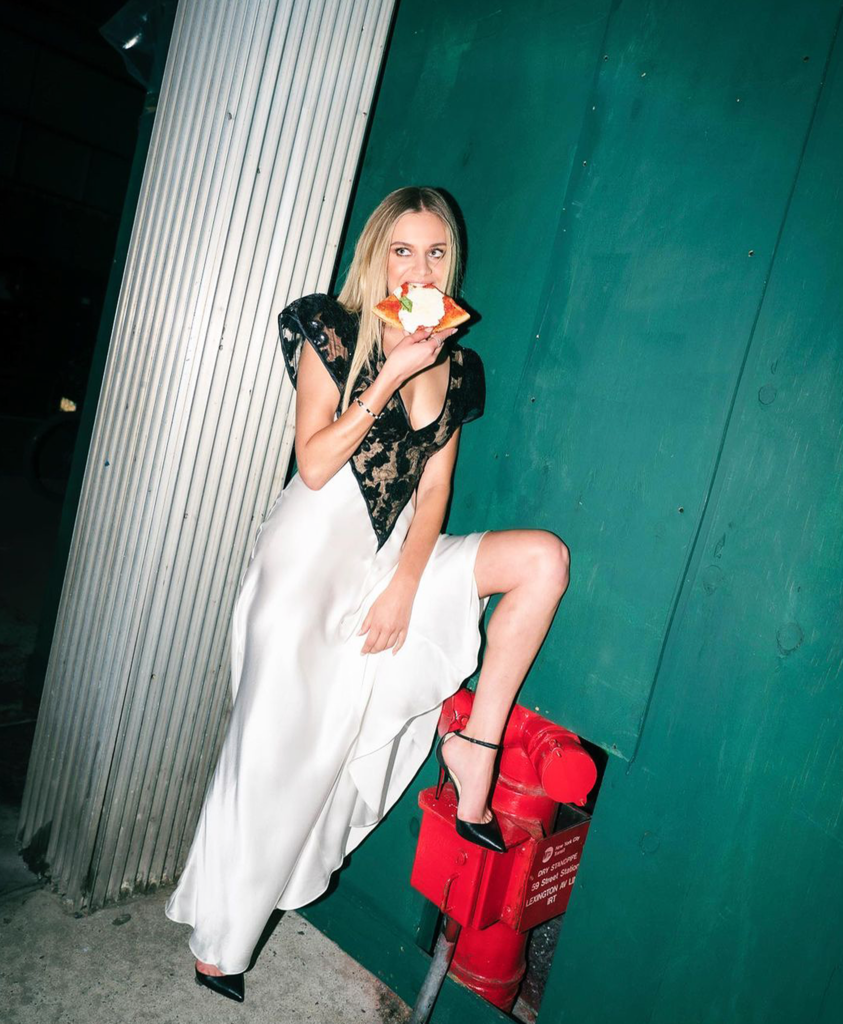
Photographed by Cibelle Levi. Kelsea Ballerini wears Rodarte to attend the 2022 Harper’s BAZAAR ICONS party.
The pursuit of happiness isn’t a linear journey for Ballerini, or most, but the lessons you learn as you embrace change can clear the fog—making your path more lucid. “The end of the album is a song called ‘What I Have’ and it’s the exhale saying these are all the things I’ve experienced that are subject to change but what I have right now is meant for me and even though that may not be what I have tomorrow, in this moment it is for me.” The key to Ballerini’s woosah is in the ambiguity of her perspective which is something she had to learn. “As a little girl, I so bought into fairytale culture and I thought everything had to be grandiose and big. I’m lucky because I have moments in my life that feel like that but at the end of the day the things that have kept my train on the tracks have been my dog, my family, my friends—the little things.” She continues, reflecting on how the sentiment of “What I Have” resonates with the present moment of our conversation, “I’m in such a season of change right now, ironically, that still being able to zoom in and go what I have is meant for me and what I have is enough is the thing getting me through the day.” Said change could be a multitude of things, personal and professional, as she recently shared with fans that she’s going through a divorce and embarking on a 10-night tour to coincide with her album’s release.
For the anxiously inclined or Ballerini’s fellow Virgos, pausing to take inventory of your life sounds easy in theory but harder in practice. “I had this realization over the last few years where I was like I don’t remember so much of my life because I’m such a Virgo. I’m always planning, forward motion is so important to me, and I just want to cross things off a list.” As she says this, I can’t help but laugh thinking of all my goal-oriented Virgo friends who subscribe to the same ideology. “In doing that I’m always looking forward and I’m never where I am. Life’s too cool and I want to be able to be in it as it happens so it’s taken some self-awareness.” The introspectiveness present in her writing extends to our conversation as well. It’s a bonus, not all artists are comfortable elaborating on vulnerable topics in other mediums such as poetry or interviews, and it gives fans deeper insight into them as a person.
Ballerini partially credits her honesty as an effort to be a good role model, which has also been subject to change. “I’ve redefined what a role model means because I used to think it meant you have to be squeaky clean, smiley, never show any faults, and believe in whatever everyone else around you believes in because that’s what is right and acceptable. I have shaken that [the last few years] and gone like no if I was a mom and I had a daughter what would I want my daughter to look up to? Someone who is showing real emotion, real life, real body, real hardships, real happiness—all of it.” Openness, Ballerini learned, is the key to representation in the public eye, and normalizing the roller coaster ride that is life teaches others to embrace themselves because perfection doesn’t exist. “I don’t claim to do it well all of the time but I definitely do my best to go,” she says, making a hand motion of putting everything on the table in front of her. “I have a cool job and here’s some stuff I get to do like tonight I’m going to this Harper’s Bazaar event and I’m really excited. I’m going to post about it but I’m also going through a really difficult personal time right now and I’m showing up and being open about that too. Two things can be true at the same time, that’s life, and presenting it in that way, to me, is what a role model means now.”
The most successful people, the top tier like the Shanias and the legend status, are the most normal. They’re the ones that prioritize their real life, real friends, and time away from the bubble.
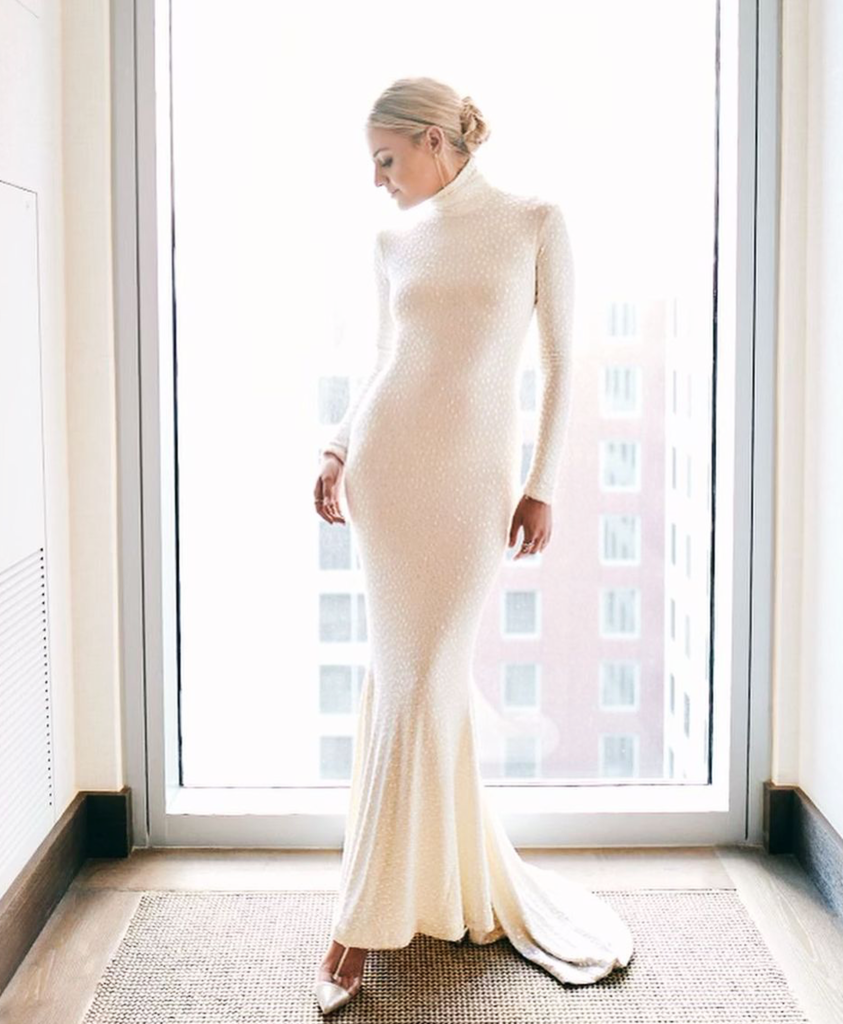
Photographed by John Shearer. Kelsea wearing Shania Twain’s 1999 Grammys dress.
Ballerini’s attendance at New York Fashion Week may not be a given as much as it is for artists from other genres, but the genuine enthusiasm she shares is tied to the intrinsic girly girl in her. “I’m excited because I feel like it’s one of the things that country music doesn’t get involved in too much. I find a lot of pride in being someone [whose] feet are planted in country music, that’s who I am and in the same breath, you can be more than one thing. Pushing boundaries and showing up in places that [country] core isn’t always represented is important to me. I love fashion, I used to play dress-up all the time, [and] that’s what this week feels like. [I’m] excited to show up and be a girly girl.” Her affinity for fashion has made for many memorable style moments like when she wore Shania Twain’s 1999 Grammy Awards white turtleneck gown to the 2022 ACM Awards earlier this year. The tribute to one of country music’s iconic female artists was a full-circle moment made more heartening by their real-life friendship. “I have this video of whenever I saw [Shania] outside The Ryman [Auditorium] and she has this look on her face like aww—it was a sweet moment,” Ballerini shares.
In a genre as collaborative as country music, it’s almost tradition for the older icons to embrace newer generations but underneath the glitz and glamour are opportunities to learn about what got them there. “The most successful people, the top tier [like] the Shanias [and] the legend status, are the most normal. They’re the ones that prioritize their real life, real friends, and time away from the bubble. I’ve had some of the [deepest] healing conversations as a newer artist with people like that. They’re the people that call when they see something go down in my life and check on me—that matters. The fact that [they] happen to be some of the most successful people in the world—I think that’s why,” Ballerini says of her takeaways which boil down to the values she writes about in “What I Have” and being a good role model. The emphasis on real-life friendships is also what informed her decision to add Kelly Clarkson and Carly Pearce as featured artists on the song “You’re Drunk, Go Home”.
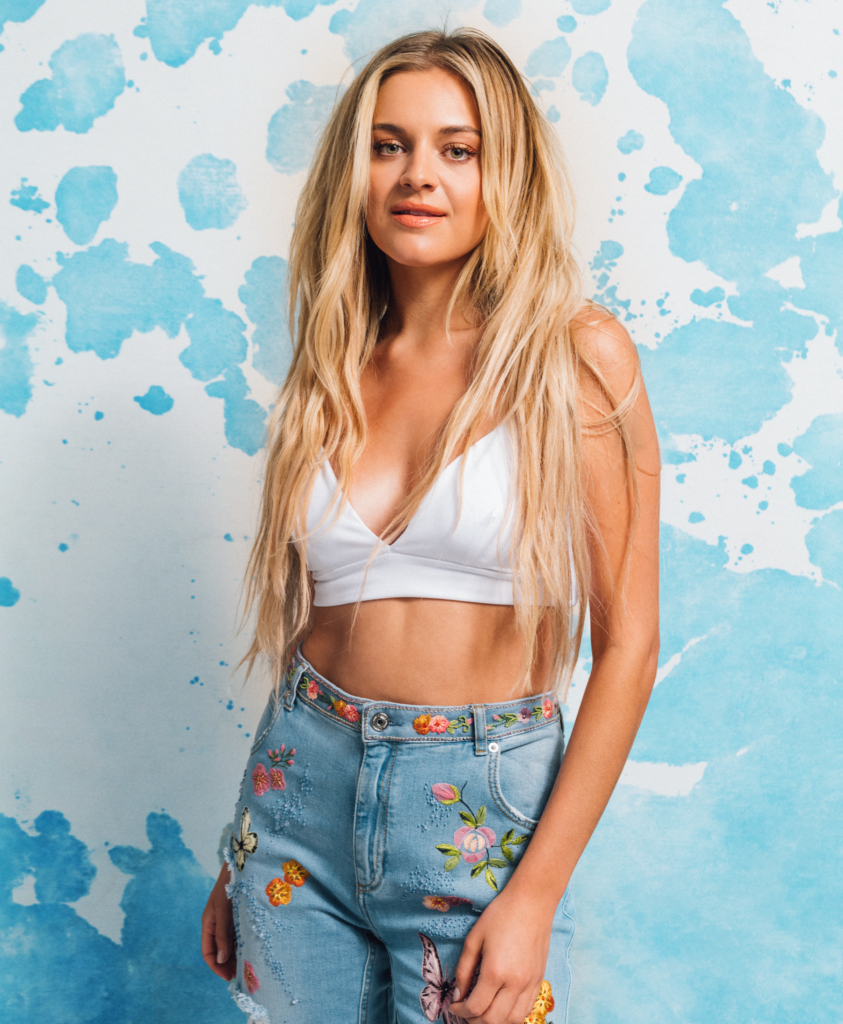
Photographed by Daniel Prakopcyk.
“I was not planning on having a collaboration on this album, [but] as soon as we wrote [You’re Drunk, Go Home] I was like how cool would it be to have [not] one but two other strong, sassy, [and] funny female voices alongside to tell the story. I also promised myself that I would only collaborate with people I actually have a real-life friendship with because I think that helps protect the song and the moment. So, I asked them both and they said yes and they added so much personality,” Ballerini says excitedly about the album’s witty song which she wanted to feel like what “hole in the bottle” was on her last record, kelsea. The anti-hook-up empowering friendship theme of “You’re Drunk, Go Home” is in the same vein as “If You Go Down (I’m Going Down Too). “It’s like my anthem for my friends because they’re such pillars in my life, female friendship is so important [to me] and I think it’s cause I didn’t have a sister,” Ballerini says referencing the latter song and the root of her ride or die friendship mantra. The only child status is something we have in common and she laughs when I mention being an only child is like being the sole guinea pig for your parents to learn parenting. Conclusively, we agree that having a sibling would have been nice, to soften the blow of familial hardship and have a companion closer in age, but the lack thereof meant our friends become our chosen family.
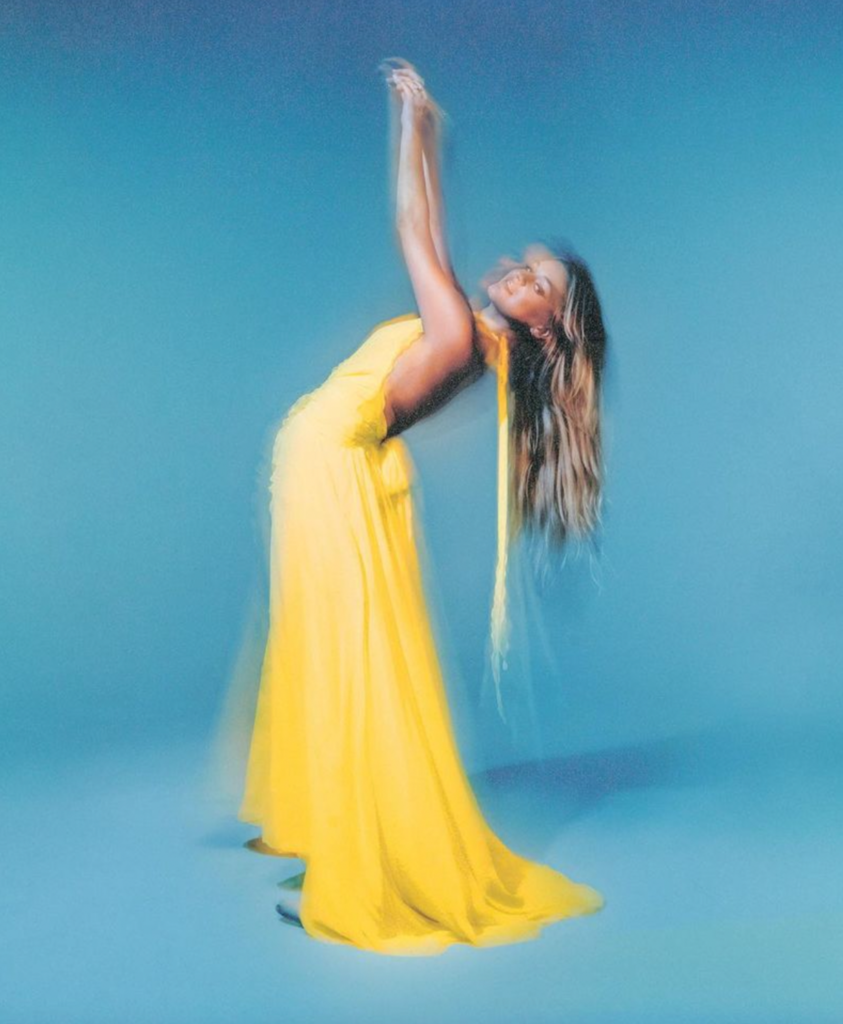
Photographed by Daniel Prakopcyk.
“I have a couple of really beautiful friendships with other artists and I lean on those heavily. I don’t have many anymore but the few I have are so near and dear to me and it’s [mutually] nurturing. Other than that I have my real life,” Ballerini says on the balance of friendships born out of her career and the ones she’s accumulated from other walks of life. Similar to much of what we’ve talked about, these learnings come from time, self-awareness, reflection and experiencing change. “When I was first starting [out], I was so starry-eyed about being in rooms with people that were famous. I wanted to be in a picture with anyone that was cool, I had a lot of value in that, and that’s the truth. As I’ve settled into my career and seen more of the corners of that celebrity culture, I’ve realized my truest and deepest connections are just not celebrities.” Perception can often be tied up in smoke and mirrors until you’re in a position to metaphorically pull back the curtain, Wizard of Oz style, and let your personal experiences inform discernment.
Funny enough, the talent that put Ballerini in said rooms early on was a surprising discovery unbiased by perception. “I never thought I was going to be a singer until my parents got divorced, I was 12, and songwriting literally fell into my lap. It was the greatest gift I’ve ever been given and it came out of nowhere. It’s been a confidant, a friend, a safe place, [and] a place to air my laundry—everything, you know? So, when I write a song I’m not thinking this is going to sound good on the radio [because] that’s not always the goal. The goal is to get whatever I need to get out of my head or my heart—out of me. It’s the purest part of what I do, I love performing but it’s not as pure as when you’re writing something for the hell of writing it.” As Ballerini says this, it becomes crystal clear that writing will always be something she has, that’s fulfilling, cathartic, and contributes to her overall happiness. Best of all, it’s not subject to change, regardless of how many other things in life are.
